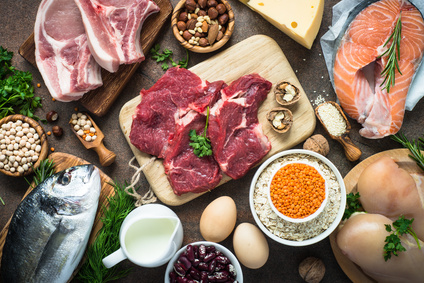No matter what your age, protein is an essential part of any balanced diet. But of course, as the body gets older its needs start to change. For example, research shows that one of the noteworthy side effects of ageing is a reduction in total body protein. This sees skeletal muscle decrease, with other physiologic proteins like tissue, blood components and immune bodies also shrinking. The phenomenon is technically known as sarcopenia and spells bad news for the body, as healthy muscle mass plays an important role ensuring it can heal wounds, fight off infections and recover from illnesses. Other side effects include insulin resistance and a heightened risk of fractures and breaks thanks to low bone mineral content.

How much protein should you be aiming for?
Currently, the recommended adult dietary allowance for protein is 0.8 grams of per kilogram of body weight. Generally, protein tissue accounts for around 30% of whole-body protein turnover, however this declines to 20% or lower when the body hits 70. There are also studies suggesting that protein tissue can start to decline from as early as 50. As a result, some dieticians are recommending that older adults load up on protein. Some more than double the recommendation to at least 1.8 grams of protein per kilogram of body mass.
Where to get protein
So where can you get protein? Dietary animal protein is one of the primary sources, with favourites including beef, chicken and fish. You’ll also find protein in animal products like cheese and milk. Of course, protein isn’t just sourced from animals. Whether you’re a vegetarian or simply opt for a relatively meat-free diet, you can load up on protein with products like tofu, soy milk, lentils, beans, nuts and seeds.
Load up on amino acids
However, if you’re loading up on plant protein you also need to make sure you’re getting all the essential amino acids your muscles need. This means you should also look for “complete” proteins like quinoa, chia and soy, which contain protein as well as all nine essential amino acids. Mixing and matching your plant proteins is also a good idea, as some different sources contain different essential amino acids. Need a little inspiration? Check out these amazing vegetarian recipes from local legend Annabel Langbein.
While “dieting” can often seem like a chore, there’s no reason why treating your body to a healthy fix of protein should have to be a drag. On the contrary, it can be fun. If you usually stick with meat, why not start experimenting with plant proteins? You can also try out new recipes, swap tips with friends and even find sneaky ways to eat protein for dessert. How can you say no to that?
Do you have any tried and tested protein rich recipes? We’d love to hear from you so go ahead and share in the comments below.









Join the Discussion
Type out your comment here:
You must be logged in to post a comment.